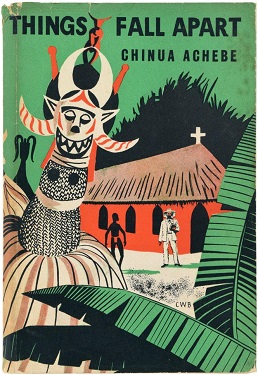Chinua Achebe’s “Things Fall Apart” explores the theme of identity in many ways, as it tells the story of Okonkwo and his struggle to maintain his sense of self amidst the changes brought about by colonialism in Nigeria.
At the beginning of the novel, Okonkwo’s identity is closely tied to his social status and reputation as a successful and respected member of his community. He is driven by a fear of weakness and failure, which stems from his father’s reputation as a lazy and ineffective man. Okonkwo’s desire to overcome his father’s legacy and establish himself as a powerful and successful figure in his own right shapes his identity and his actions throughout the novel. However, Okonkwo’s sense of identity is challenged when the white missionaries arrive in his village and disrupt the traditional customs and beliefs of his community. The missionaries bring with them a new religion and a new way of life that threaten the established order of Igbo society, and Okonkwo finds himself struggling to reconcile his sense of self with the changing world around him.

One of the ways in which the theme of identity is developed in the novel is through the depiction of Igbo culture and society. Achebe paints a rich and detailed portrait of Igbo life, from the rituals and traditions of the community to the social hierarchies and gender roles that structure their lives. Through this portrayal, the novel explores the ways in which identity is shaped by culture and tradition, and the importance of maintaining cultural identity in the face of external pressures.
Another way in which the theme of identity is developed is through the character of Okonkwo himself. Throughout the novel, Okonkwo struggles to maintain his sense of self in the face of changing circumstances and external pressures. He is torn between his desire to uphold the traditions and customs of his community and his fear of weakness and failure. This tension drives much of the novel’s plot, as Okonkwo tries to assert his authority and control over his family and his community, even as his world is rapidly changing around him.
The theme of identity is also related to the themes of power and masculinity in the novel. Okonkwo’s sense of identity is closely tied to his reputation as a strong and powerful man, and he measures his worth and success in terms of his ability to dominate others. This desire for power and control is closely linked to his fear of weakness and failure, and it drives many of his actions throughout the novel.
However, Okonkwo’s quest for power ultimately leads to his downfall, as he is unable to adapt to the changing circumstances of his world and is consumed by his own fear and rage. This suggests that a rigid and inflexible sense of identity can be dangerous, and that true strength and resilience come from the ability to adapt and change in the face of adversity.
In conclusion, the theme of identity is a central and complex theme in “Things Fall Apart.” The novel explores the ways in which identity is shaped by culture and tradition, and the importance of maintaining cultural identity in the face of external pressures. It also examines the ways in which identity is related to power, masculinity, and fear, and the dangers of a rigid and inflexible sense of self. Through its rich portrayal of Igbo culture and society and the character of Okonkwo, the novel offers a nuanced and insightful exploration of the complexities of identity and its relationship to the broader themes of the novel.